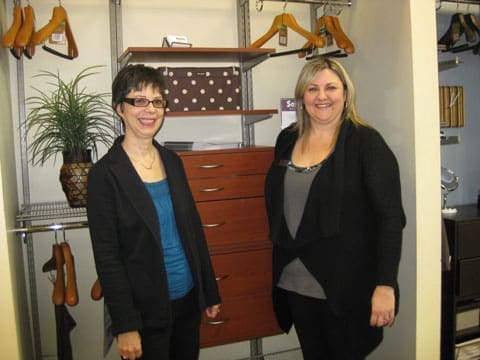The Plain Truth About Being a Professional Organizer
This page may contain links to Amazon.com or other sites from which I may receive commission on purchases you make after clicking on such links. Read my full Disclosure Policy

Becoming a professional organizer is a fabulous career choice, but there’s a lot more to it than helping clients get rid of clothes that no longer fit. Not too many people talk about the harsh realities of running an organizing business, so I’ve asked organizing expert Wendy Hollick to tell us what she’s learned since launching NEAT SPACES 10 years ago.
Wendy is the owner of NEAT SPACES Professional Organizing Service, a confidential and professional organizing service committed to turning cluttered, unorganized and stressful spaces into neat spaces. She is also the Director of Chapter Relations for Professional Organizers in Canada (POC), the founding Chair for the Halton-Peel Chapter of POC, where she served as Chair for 5 years, and a POC Silver Leaf member. She was honoured with the POC Ambassador Award in 2011 for her contributions to other organizers, her chapter, and her local community.
Wendy and I first met in 2005, when our POC Chapter took on a major organizing project at Ronald McDonald House for National Organizing Week. As her main focus was residential organizing and mine was office organizing, we ended up working together on a number of organizing projects and presentations in order to learn from one another. When I made the shift from organizing to virtual assistance, I was delighted to have the opportunity to continue working with her in my new capacity, a relationship which continues to this day.
The photo of us above was taken at Solutions – Your Organized Living Store.
Wendy, we’ve both come a long way since 2005! Would you say it’s been easy going?
Oh Janet, what a ride it’s been! I wouldn’t say easy going per se, however, it is what I love to do, so it helps you get through the demanding, overwhelming times.
Is the work just the way you thought it would be?
Actually no. LOL. It really isn’t. I initially thought it was about like with like, too much stuff, blah blah blah. But it isn’t. It’s about the person. Their mindset. Their life experiences. It’s about so much more, and for this reason I love being of help.
Getting back to stuff, there have been many surprises – like the job where I ended up helping the client cut a couch in half as it was contaminated and hauling it 500 feet – YES! 500 feet – to the curb. Tearing out all her carpet and cutting it up into 12×12 pieces. Oh my! But over the course of 3 months and losing about 20 lbs doing this job (woo hoo!), it was completed and my client could resume a lifestyle and environment that was peaceful to her. But yes, this career is not all about the pretty; it can be pretty dusty in those corners, as people do not dust clutter. 🙂
How long did it take from the time you started your organizing business to when you were able to make a decent living from it?
It took approximately 5 years before I was working full time with clients and had bookings each and every week. To supplement my income during this time, I provided in-home daycare for a couple of years and weaned down as my PO business grew. I am also the owner-operator of an in-home spa birthday party company for little girls. At this time I am a silent owner. My bread and butter has come from organizing after 5 years of being in business.
You’ve been active in the Halton-Peel Chapter of POC since you founded it in 2005. How many of the original members are still involved with the organizing industry?
That’s a very good question Janet. Unfortunately our profession has a very high attrition rate. I would guestimate that we have 25% of the original membership from 2005.
Wow! Why do you think that is?
It’s not easy to make a full-time living as a Professional Organizer. So much of what we do is not billed. And although a person may be well suited to become a professional organizer, that doesn’t always mean they are well-suited to running an organizing business. Sometimes one needs to realize their strengths and weaknesses, and if running your own business is not your forte, that’s okay – you can join a team at another PO company and still enjoy your passion of organizing professionally.
Running your own business and being self-employed is a 24 hour a day commitment. And when you are self-employed, your entire family is self-employed. It’s a big commitment and yes, there are sacrifices. One that really sticks out in my mind is when my daughter had to have her appendix out and I wasn’t able to be there – my mom attended as well as my husband, but I didn’t arrive till later that day.
Why do you think you’ve been successful when so many others have not been able to?
I work 24/7, I have no client boundaries and have a BlackBerry that is with me till the time I go to bed. I have a very “can do” personality, I pay extra attention to detail, and always go above and beyond. I take no shortcuts. You can’t.
What is the best advice you can give to someone who is starting out as a professional organizer?
Love what you do, know what your skill set is, hire out for your weaknesses and give it your all. ALWAYS!
Wendy, thank you so much for your openness!
Who’s next?
If you’d like to be interviewed for Your Organizing Business, simply fill out the questionnaire.




Great article Janet. It is honest and upfront about what it takes to run an organizing business. I am only in the 1st year of my business, and it has been slow, so it gives me confidence that I am not doing anything wrong it will just take time to build a client base. Perseverance and hard work will pay off. Glad I saw this post this morning.
Jill, I am so glad you found it encouraging! I was afraid it might scare some people off – but then those are probably the ones who aren’t prepared to put in all the hard work it takes to become successful. Keep doing what you’re doing!
Thank you Janet and Wendy for sharing this. It’s really valuable and honest. I was particularly interested in your comments re the professions high attrition rate. That seems to be applicable worldwide. Keep up the good work (both of you).
It’s sad, but I wonder if it’s true of other professions as well. They do say that most small businesses fail within the first three years.
This is a wonderful interview. As a newer professional organizer, I love learning from experienced professional organizers like Wendy.
Nancy, you’ll find many guest posts here by experienced professional organizers. To your success!
Great article!
I found it really interesting to note Wendy’s response to why she’s been successful. It seems like a combination of excellent customer service and a lengthy work day (24/7 I believe she stated). I wonder, is it possible to be successful and still enforce “client boundaries”.
Thoughts?
Lisa
I’m hoping another organizer can chime in on this, Lisa, but I’m sure it must be. My dad ran his own business for decades, supporting our family of five, and almost never made himself available evenings, weekends, or holidays.
Great interview, Janet. Wendy, I just crossed the six year mark in my own business and for the first time, things have really taken off. It was nice to read that the five year mark was key for you as well. Thanks for sharing.
Congratulations, Alys, on hanging in there! Keep it up and I’m sure your business will continue to grow for a long time.
Love the honesty in this interview ladies. As someone that has been consulting since 1995, I can comment to Lisa’s question above. It is possible to grow a successful business and have boundaries in place. Boundaries are a personal choice and practicing how to ethically and comfortably keep them in place while providing excellent customer service takes practice. I have a number of boundaries in place in my business that allow me to have the freedom that I wanted when I began my consulting/coaching business. My clients have never had concern with the boundaries and I teach them how to create their lifestyle business model too.
I believe that the attrition in a number of solo business industries is high for a a few reasons:
– lack of business acumen
– lack of support
– inability to delegate
– unrealistic expectations on how to get business (the build it and they will come philosophy is no longer true — you have to do more than that.)
Thoughts?
I do agree with the reasons you’ve mentioned for high attrition. Lots of people seem to have the mentality that all they have to do is put up a flyer in the grocery store (for example) and their phone will be ringing off the hook. One former colleague (who has given up on her business) was disappointed that she didn’t get any business out of an event she attended at the local Chamber of Commerce – one event! Growing a business is hard work and it takes a lot of dedication and perseverance to make it successful.
Candid. Nicely done. Thanks Janet and Wendy.
Loved reading this today! Honestly, I found the other comments just as encouraging as the article!
All the advice was totaly bang on. The 5 year mark was pivotal for me as well. Thanks for sharing some solid advice.